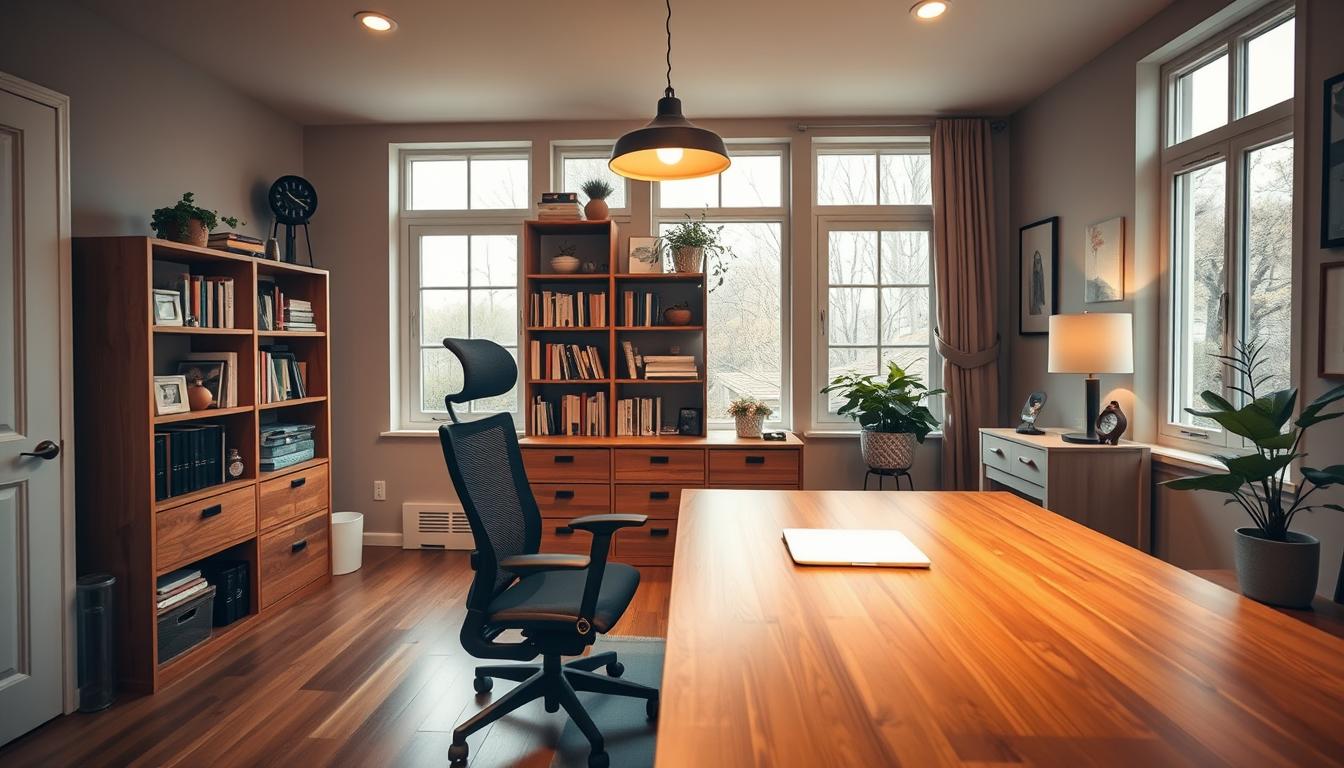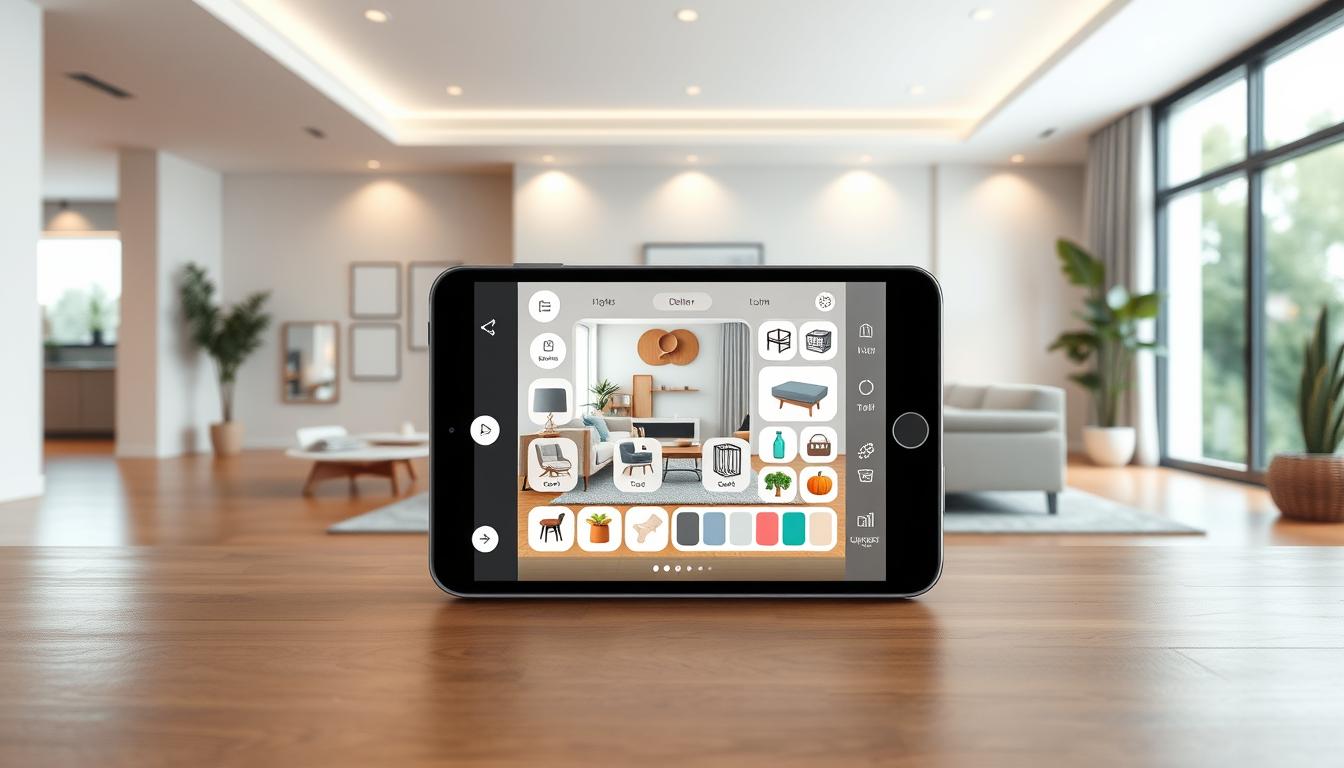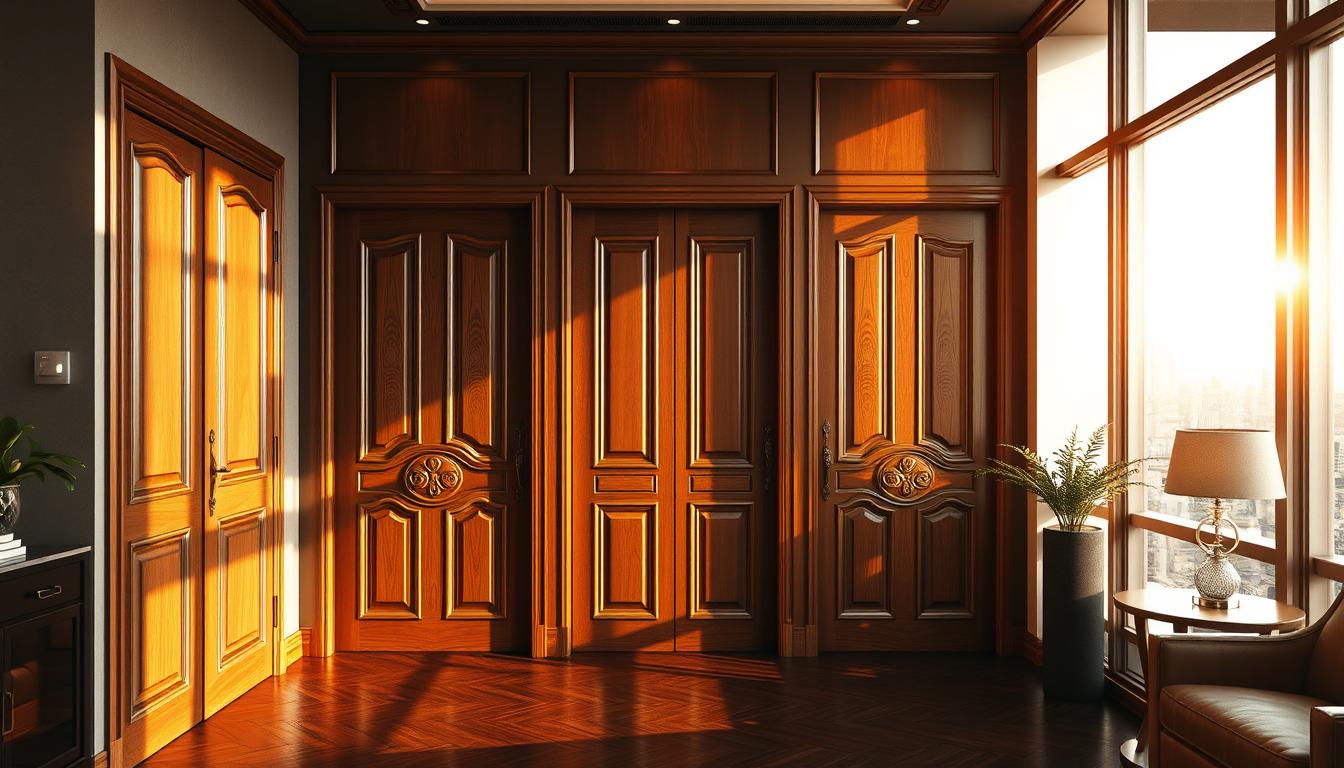More people work from home than ever before. Creating a productive workspace at home is now a top priority. A well-designed workspace can greatly improve your efficiency and creativity.
Experts say a spacious desk, ample storage, and good task lighting are key. These elements are crucial for a home office.
We will explore the best home office interior design ideas to make your workspace inspiring. By choosing the right layout, color palette, and decor, you can make a space that boosts efficiency and creativity.
Key Takeaways
- Create a dedicated workspace to boost productivity
- Incorporate a spacious desk and ample storage
- Use good task lighting to reduce eye strain
- Consider the layout and color palette of your workspace
- Add decor that inspires creativity and efficiency
Creating a Functional Layout
Building a functional home office layout is key to being productive. A well-designed space boosts our work efficiency and well-being.
Designing an Efficient Floor Plan
To make a good floor plan, think about how we move around in our office. A clutter-free space helps us stay focused. We should have areas for different tasks, like working and reading.
- Measure the room and create a scale drawing to visualize the space.
- Identify the primary work area and position it in a way that maximizes natural light.
- Consider the ‘work triangle’ concept, ensuring that our workspace, storage, and seating form an efficient triangle.
Choosing the Right Furniture
Picking the right furniture is key for an ergonomic home office setup. We need furniture that’s both useful and comfy. A good chair and a big desk are must-haves for a productive space.
- Invest in an ergonomic chair that provides adequate lumbar support.
- Choose a desk that is the right height for standing or sitting, with enough space for our computer, papers, and other essentials.
- Consider multi-functional furniture pieces that can help reduce clutter.
Incorporating Storage Solutions
Good storage is crucial for a tidy office. We can use shelves, file cabinets, and desk organizers to stay organized.
- Install shelving units or bookcases to store books, binders, and other reference materials.
- Use file cabinets to keep important documents organized and out of the way.
- Utilize desk organizers and trays to manage office supplies and paperwork.
By following these tips, we can make a home office that’s both useful and nice to look at. This will improve our productivity and work experience.
Selecting the Right Color Palette
Choosing the perfect colors for your home office is key to a space that sparks creativity and focus. The colors you pick can greatly affect your mood, productivity, and work experience.
Understanding Color Psychology
Colors deeply impact our emotions and productivity. They can trigger different reactions, making it important to pick colors that match your work needs. For example, calming colors like blues and greens help you focus and concentrate. On the other hand, vibrant colors like oranges and yellows boost creativity and energy.
Here’s a simple color psychology guide to help you choose wisely:
| Color | Emotional Impact | Ideal Use |
|---|---|---|
| Blue | Calming, Trusting | Focus-intensive tasks |
| Green | Balancing, Refreshing | Long work hours, relaxation |
| Orange | Energizing, Creative | Brainstorming, creative tasks |
| Yellow | Uplifting, Optimistic | Morning work, positive vibes |
Trends in Home Office Colors
Keeping up with the latest trends can make your workspace stylish and modern. Right now, neutral tones paired with bold accent colors are in. They offer a mix of calmness and creativity. Also, adding natural hues can make your office feel warm and cozy.
When picking your colors, think about the natural light, your furniture, and what you like. This way, you’ll create a space that’s both inspiring and productive.
Enhancing Natural Light
Getting more natural light is key for a productive home office. It not only makes you feel better but also helps you work better. We’ll look at how to place your desk and pick the best window treatments for more light, even in a small home office layout.
Positioning Your Workspace
Putting your desk near a window is a smart move. It can really change how you feel at work. If you can, put your desk right in front of a window for lots of natural light. For small home offices, you might need to move things around to get more light.
Choosing Window Treatments
The right window treatments can control how much light gets in. Think about using sheer curtains or blinds to adjust the light. For a healthy home office, choose ones that let in some light but also filter it.
Here are some good choices:
- Sheer curtains for a soft, diffused light
- Venetian blinds for adjustable light control
- Roller shades for a modern, minimalist look
By picking the right window treatments, you can make your workspace both productive and cozy.
Optimizing Your Lighting
The right lighting can turn your home office into a productive and creative space. A good lighting system does more than just light up your area. It also adds to the minimalist look, making your office calm and focused.
Types of Office Lighting
Understanding the different types of lighting is key to a flexible and efficient system. You have:
- Overhead Lighting: Lights up the whole room.
- Task Lighting: Shines light on specific areas, like your desk.
- Ambient Lighting: Adds warmth and coziness, often paired with other lights.
Using these types together creates a layered lighting system. You can adjust it for different times and tasks.
| Lighting Type | Purpose | Examples |
|---|---|---|
| Overhead Lighting | General Illumination | Ceiling fixtures, recessed lighting |
| Task Lighting | Focused Work Areas | Desk lamps, under-cabinet lighting |
| Ambient Lighting | Atmosphere and Mood | Table lamps, floor lamps |
Dimmable Options for Flexibility
Dimmable lighting adds flexibility to your system. You can change the light’s brightness as needed, whether you’re working hard or reading.
Dimmable LED lights are great for home offices. They’re energy-saving and last a long time. They work well for both overhead and task lighting, offering adjustable brightness.
Optimizing your lighting and using minimalist office furniture can make your home office both functional and beautiful. The goal is to find a balance between looks and usefulness. This ensures your workspace boosts your productivity and happiness.
Personalizing Your Space
Making your home office your own is key to being more productive and creative. A space that shows your personality and style can really improve your work and happiness.
Artistic Touches
Adding artistic elements to your office can make it more inspiring. Think about using original artwork, colorful rugs, or unique decorations that match your taste.
Here are some ideas for adding artistic flair:
- Display motivational quotes or prints.
- Choose a bold piece of furniture that shows your style.
- Bring in nature, like a vase with fresh flowers.
Incorporating Personal Mementos
Adding personal touches to your office can make it feel more like home. This could be family photos, heirlooms, or other special items that warm up your workspace.
Here’s a table to help you add personal mementos:
| Memento | Significance | Display Idea |
|---|---|---|
| Family Photos | Personal Connection | Frame and hang on a wall or place on a desk. |
| Heirlooms | Sentimental Value | Display on a shelf or in a glass cabinet. |
| Awards or Achievements | Professional Pride | Display on a wall or in a dedicated showcase. |
By adding artistic touches and personal mementos, you can make your home office both productive and a true reflection of you.
Technology Integration
Working from home means we need good tech in our offices. A well-set-up home office boosts productivity and keeps things tidy. This makes it easier to focus on our work.
To get this right, we must think about two main things. First, we need smart gadgets for our office. Second, we must manage cables well. These steps help make our work space smooth and efficient.
Smart Office Gadgets
Smart gadgets make our work easier. Some top gadgets include:
- Smart Speakers: They let us make calls, set reminders, and play music that helps us work better.
- Wireless Charging Pads: They keep our devices charged and our desk clear.
- Automated Lighting Systems: They adjust the light for different tasks and times, making us more comfortable and saving energy.
These gadgets make our home office better and more comfortable to work in.
Cable Management Solutions
Keeping our workspace tidy is key. Here are some ways to do it:
- Using Cable Ties: They keep cables neat and stop them from getting knotted.
- Cable Management Boxes: These hide cables and keep our space clean.
- Labeling Cables: It helps us know which cable goes where, making it easier to fix problems or change our setup.
Using these cable management tips, we can cut down on clutter and make our home office look better.
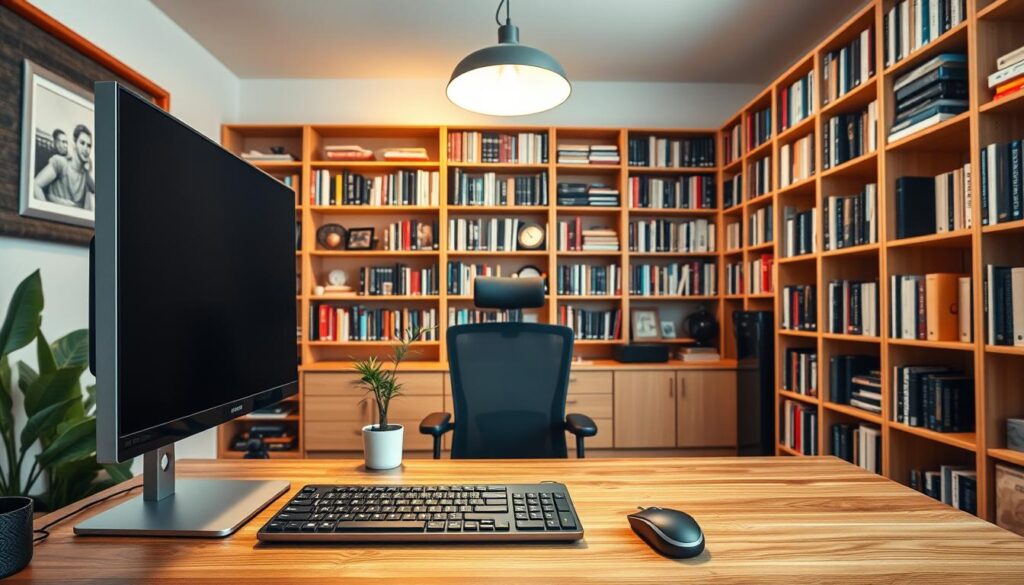
In short, adding tech to our home office is more than just gadgets. It’s about making a space that works well and feels good. By picking the right gadgets and managing cables, we can work better and enjoy our space more.
Incorporating Plants
Adding plants to your home office can boost your productivity and well-being. Greenery makes your workspace more inviting and comfortable. It encourages creativity and focus.
Advantages of Having Plants Indoors
Indoor plants are not just pretty; they’re good for you too. They clean the air, lower stress, and improve focus and mental clarity. Adding plants to your ergonomic home office setup is a smart move.
Studies show plants can lift your mood and energy. They’re perfect for any home office. Plus, they bring natural beauty to your space, matching well with minimalist office furniture.
Top Picks for Office Plants
When picking plants for your office, choose ones that are easy to care for. Here are some great options:
- Snake plants clean the air and don’t need much light.
- Pothos are versatile and grow well in different light conditions.
- Spider plants are easy to care for and add a decorative touch.
- ZZ Plant is low-maintenance and can go weeks without water.
By picking the right plants, you can make your home office greener and healthier. It will support your productivity and well-being.
Creating a Distraction-Free Environment
A productive home office is more than looks. It’s about creating a space that helps us focus and avoid distractions. To make this happen, we must think about several important factors.
Noise-Reducing Solutions
Noise is a big distraction in home offices. To fight this, we can use noise-reducing solutions. Options include soundproofing, acoustic panels, or noise-cancelling headphones. These tools help us focus better by reducing background noise.
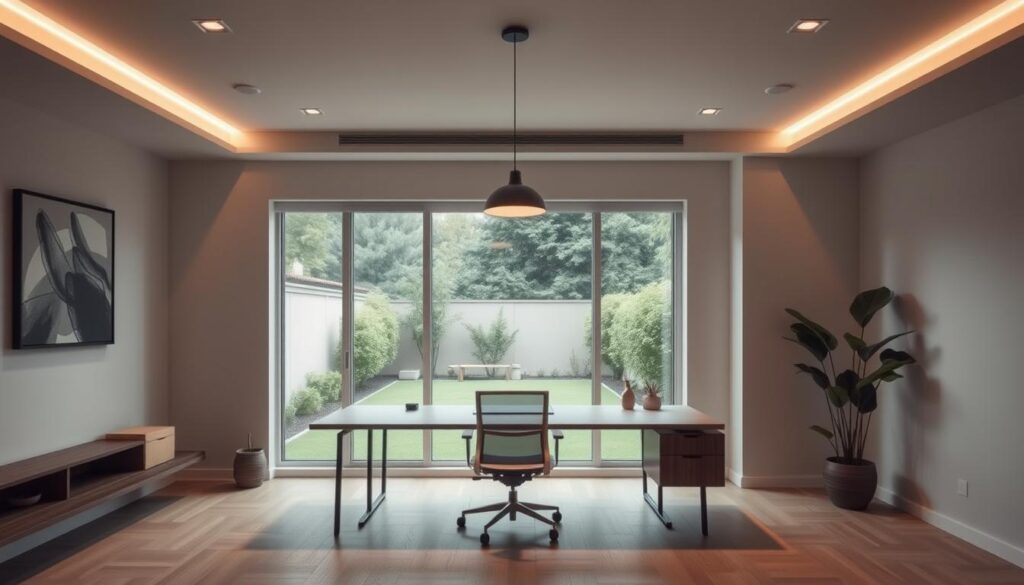
Creating a quiet area in our office is also smart. We can set up a specific work zone, away from busy spots and loud appliances. This makes a sanctuary for productivity, where we can work without interruptions.
Decluttering Techniques
Clutter is another big distraction. To deal with it, we can use decluttering techniques. Begin by sorting items into ‘keep’, ‘donate’, and ‘discard’ piles. Be honest with yourself – if you haven’t used something in a year, you probably won’t miss it. Keeping our space tidy helps us stay focused.
Also, using storage solutions helps keep things organized. This includes file cabinets, desk organizers, or shelves. They keep important items handy while keeping the area clear. A clutter-free space reduces stress and boosts productivity.
By following these tips, we can make a modern home office decor that’s both stylish and productive. A space free from distractions is essential for a stylish workspace inspiration that boosts our work efficiency.
Ergonomics in Home Office Design
Ergonomics is key to making your home office a place of well-being and productivity. A well-designed space can lower the risk of discomfort and injury. This leads to a more efficient work area.
Choosing an Ergonomic Chair
An ergonomic chair is essential for a comfortable home office. It supports good posture, easing strain on your back and legs. Look for adjustable height, lumbar support, and armrests when choosing a chair.
Desk Height and Setup Considerations
Getting your desk height and setup right is vital for comfort and productivity. Make sure your desk is at a height that’s comfortable for standing or sitting. Also, place your monitor, keyboard, and other essentials to avoid body strain.
| Ergonomic Element | Recommended Setup | Benefits |
|---|---|---|
| Chair Height | Feet flat on floor or on a footrest, knees at or below hip level | Reduces strain on legs and back |
| Monitor Position | Top of monitor at eye level, at least an arm’s length away | Minimizes eye strain and promotes good posture |
| Keyboard and Mouse | Close to body, with wrists straight | Prevents strain on wrists and hands |
By focusing on ergonomics in your home office design, you can make a space that’s both productive and comfortable. A well-designed workspace is key for your well-being and efficiency.
Seasonal Decor Ideas
As we move through the year, our home office can get a fresh look. Adding seasonal touches keeps things lively and boosts our creativity and work.
Refreshing Your Space Year-Round
To keep your home office lively, change up your decor with the seasons. In spring, add fresh flowers or plants to brighten up your space. Summer is the time for light, airy fabrics and bright colors to brighten the mood.
Autumn brings warm colors and natural elements like wood and leaves for a cozy feel. Winter is perfect for a simple look with monochromatic colors or festive decorations to celebrate the holidays.
Holiday-Themed Office Decor
Holiday decor can make your home office fun and festive. For Christmas, hang stockings, display holiday figures, or set up a small tree on your desk.
For Halloween or Thanksgiving, use decorations like pumpkins, autumn leaves, or spooky items to make your workspace unique.
Tips for Seasonal Decor:
- Change your office colors to match the season.
- Add natural elements like flowers, branches, or pinecones.
- Swap out throw pillows and blankets for the season.
- Use holiday-themed accessories for a festive look.
| Season | Decor Ideas | Color Palette |
|---|---|---|
| Spring | Fresh flowers, plants | Pastel colors, greens |
| Summer | Light textiles, bright colors | Bright whites, blues |
| Autumn | Warm tones, natural elements | Oranges, reds, yellows |
| Winter | Monochromatic schemes, festive touches | Blues, silvers, golds |
By adding seasonal decor to your home office, you keep it creative and inspiring all year. Also, remember to keep your ergonomic home office setup for comfort and efficiency.
Final Touches and Accents
As we finish our home office design, adding the final touches is key. A well-designed space is not just useful but also shows our personality. It gives us stylish ideas for working better.
Decorative Elements
Choosing decorative accessories adds a personal flair to your office. Pick items that match your work style, like unique vases or abstract art. These pieces should enhance your office’s look.
Wall Art
Wall art can make your workspace feel more inspiring. Choose pieces that spark creativity and motivation, like quotes or nature prints. This boosts both the look and productivity of your space.
With these final touches, you’ll have a home office that looks great and works well. It’s the perfect mix of design and inspiration for a productive space.

